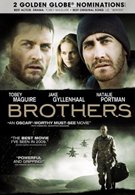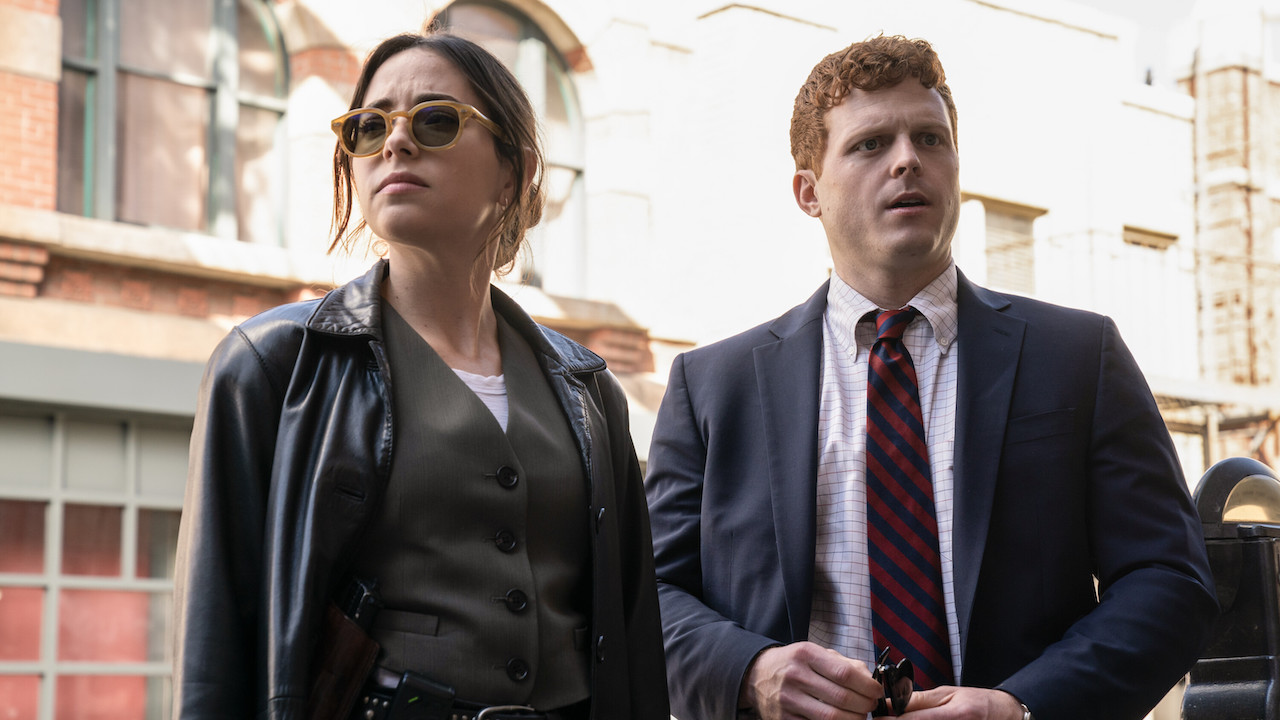The trailer for Brothers is misleading. It sets up the story of a liaison between the brother of a man in combat and his beautiful wife, and the ramifications of that affair. But this is a stretch from the truth; Natalie Portman plays Grace Cahill, the beautiful wife, and Jake Gyllenhaal plays Tommy Cahill, the brother who steps in when it seems husband Capt. Sam Cahill (Tobey Maguire) has expired in an Afghani hellhole. This isn’t to say that misleading equates to awful. The score for Brothers is enchanting, beautiful, uncanny, and candid -- the most unique thing I’ve heard since the lulling music inAmerican Beauty (perhaps because Thomas Newman was responsible for both?). Brothers boasts a slew of great actors and a director (Jim Sheridan), whose seeming obsession with family (In the Name of the Father, In America) has produced some great stories. Brothers gives context through its details. Capt. Sam Cahill’s family doesn’t belong to the world of upper-class values and aesthetics that is often prevalent in war-family films. He drives a truck. He lives in a town with family businesses and billboards that focus on praying for troops. Even the backstory of the Cahill family and their issues is slowly pressed on the viewer in a way that naturally conveys information without burdening the audience with too much at once. Some of these ideas are catchy, and much appreciated.
Yet some of the film’s most basic concepts are misplaced. In the first 10 minutes of the film, there is a strain between Maguire and the affection he is trying to exude for his girls (played by Bailee Madison and Taylor Geare). The strain extends further when looking at the relationship Portman and Maguire are attempting to portray. There’s just no chemistry between the couple, and it’s a stretch to see them play make-believe at magic love. Portman, too, is an ill-fitting choice as a parent. I think they were going for Portman-as-an-average-woman, the type of no-nonsense young mother who does the best she can for her kids, all the while trying to find happiness -- ala Where the Heart is. But Portman can no longer play 19 and scared, nor is she suited for simplistically complicated and less-than-glamorous.
And what about Sam Shepard’s role? I’ve never seen someone so capably play the Vietnam vet, alcoholic father with so little to work from in a script. Not to mention grandmother Elsie, played by Mare Cunningham, whose role is as stagnant as a white tablecloth on a breezeless plain (although she might as well be hiding under it).
What a strange dichotomy. On one hand, the audience is given solid performances by Portman, Gyllenhaal, and Shepard, who are given hollow, porcelain characters. Maguire, playing the one dynamic character in the film, is barely treading water in an acting performance that is at best too effeminate. And is lauded for it. No doubt he is trying very, very hard throughout the film -- the veins in his head bulge, his body moves in animated disconnect, and…he pauses…for effect. It’s unrealistic and it’s too much. I don’t care if he gets nominated a thousand times; Maguire’s still giving us Spiderman.
Brothers is not a bad movie. It’s slow and is oftentimes a renewal of format, but it has moments that ring true. Often the greatest moments are those when the characters are relaxed and hanging out. Look to the scenes where Geare makes pancakes, where Gyllenhaal (with buddies that include Ethan Suplee) repaints a house, where Portman and Gyllenhaal smoke pot. Those scenes have the sparks. Brothers isn’t missing the cow that ignited The Great Chicago Fire. But it is missing the interesting shenanigans that kept the fire burning for over a day. The disc for Brothers is actually pretty cool. It features a commentary version that you can watch while the film plays in the backdrop, a feature which is becoming pretty standard. The real gem here is a look at the 2004 film, Brødre, and how writer David Benioff and director Jim Sheridan turned the Danish film into an American story. There’s also a behind-the-scenes interview with much of the cast called “Film and Family,” which is less interesting because of its topic and more interesting because it gives a glimpse of the cast and workers as more than their characters or behind-the-curtain jobs.
NCIS: Origins' Showrunner Revealed 'The Real Highlight' Of Learning Season 2 Was Happening, And I Discovered They Pulled Off An Amazing Achievement In The Process
Why One The Summer I Turned Pretty Fan Thinks A Parallel Between The Latest Poster And An Audrey Hepburn Movie Spoils The End
I Talked To The Wedding Banquet Director About My Favorite Scene, And Turns Out Youn Yuh-Jung Actually Had A Key Note That Made It Better











